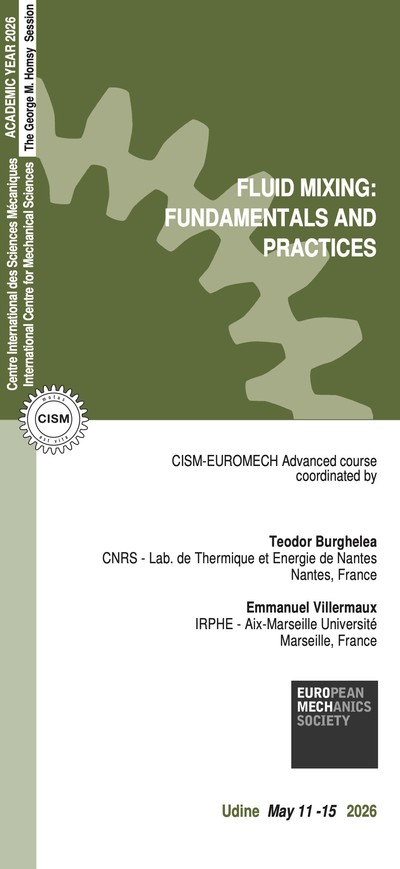Delays and structures pervade the realistic modeling of populations and their investigation under the paradigm of dynamical systems. They prove to be essential also in control and related fields, where modeling through delay functional or partial differential equations has become increasingly fundamental. The inclusion of past history in the time evolution and the introduction of structuring variables add nontrivial complexities with respect to ordinary systems, balancing the undoubted advantage of dealing with more realistic models. Equations involving time delays and structures both generate dynamical systems of infinite dimension, asking for advanced methods in the mathematical analysis and the numerical treatment. Finally, understanding stability of equilibria and other invariants is crucial and often requires sophisticated numerical and computational approaches.
The school brings together strong and up-to-date contributions in population dynamics and related fields as far as delays and structures give fundamental tools for the realistic modeling of, e.g., the transmission of an infectious disease, the evolution of a resource-consumer scenario or the competition in a predator-prey system. Numerical and computational expertise is also offered, providing reliable approaches towards a practical and accessible analysis. The course aims at discussing the most recent advances in the different contexts of the relevant mathematical analysis (functional aspects of semigroup theory); the concerned modeling approaches (delay differential, renewal and partial differential equations of evolution type, including multi-structured, neutral and state-dependent equations); the numerical and computational techniques to operate with infinite-dimensional dynamical systems (simulation, stability, bifurcation). This knowledge will be employed to discuss applications from ecology, epidemiology and life sciences in general. Laboratory sessions will allow the participants to learn both theoretical considerations and the practical application of modern software and packages (MATLAB/Octave, Python, MatCont, DDE-Biftool). Analysis, modeling, methods and applications will be illustrated focusing also on their interdisciplinary connections, starting from rapid introductions of the basics and reaching a state-of-the-art level by evolving classic approaches into modern perspectives.
The school is primarily addressed to PhD students and post-docs in the fields connected to structured population dynamics and dynamical systems involving time delays and their numerical analysis, ranging from mathematics to engineering and physics. Young and senior researchers in the above or neighboring fields, interested in gaining a compact yet comprehensive overview of population dynamics with delays and structures, are also welcome from academia or private R&D centers. The school also offers the possibility to learn and apply relevant software and computational tools through the investigation of case studies in the planned laboratory sessions.
C. Barril, A. Calsina, O. Diekmann and J.Z. Farkas. On the formulation of size-structured consumer resource models (with special attention for the principle of linearized stability), Math. Models Methods Appl. Sci., 32(6):1141-1191, 2022.
A. Bellen and M. Zennaro. Numerical methods for delay differential equations. Oxford University Press, 2003.
A. Bellen, N. Guglielmi, S. Maset and M. Zennaro. Recent trends in the numerical solution of retarded functional differential equations, Acta Numerica, 18:1-110, 2009.
D. Breda, O. Diekmann, M. Gyllenberg, F. Scarabel and R. Vermiglio. Pseudospectral discretization of nonlinear delay equations: new prospects for numerical bifurcation analysis, SIAM J. Appl. Dyn. Sys., 15(1):1-23, 2016.
H. Kang, X. Huo and S. Ruan. On first-order hyperbolic partial differential equations with two internal variables modeling population dynamics of two physiological structures, Ann. Mat. Pura Appl., 200:403-452, 2021.
H. Kang, X. Huo and S. Ruan. Nonlinear physiologically-structured population models with two internal variables, J. Nonlinear Sci., 3:2847-2884, 2020.
H. Kang, S. Ruan and X. Yu, Age-structured population dynamics with nonlocal diffusion, J. Dyn. Differ. Equ., 34:789-823, 2022.
H. Kang and S. Ruan. Nonlinear age-structured population models with nonlocal diffusion and nonlocal boundary conditions, J. Differ. Equ., 278:430-462, 2021.
H. Smith. An introduction to delay differential equations with applications to the life sciences, Springer 2011.
F. Scarabel, D. Breda, O. Diekmann, M. Gyllenberg and R. Vermiglio. Numerical bifurcation analysis of physiologically structured population models via pseudospectral approximation, Vietnam J. Math., 49:37-67, 2021.
F. Scarabel, O. Diekmann and R. Vermiglio. Numerical bifurcation analysis of renewal equations via pseudospectral approximation, J. Comput. Appl. Math., 397:113611, 2021.
see Davide Liessi's lectures
5 lectures plus discussion on: population dynamics - the notion of state at the individual and at the population level; the notion of environmental condition; the formulation of a size structured model, both in terms of a PDE and in terms of a renewal equation; functional analytic and dynamical systems aspects; density dependence via feedback to the environmental condition; variable maturation delay; biological insights.
5 lectures plus discussion on: modeling with state-dependent delays; delays defined by threshold conditions; dynamical systems formulation of state-dependent delay equations; linearization and numerical techniques.
and Ted Ramaj (LIAM, York University, Toronto, Canada) and Alessia Andò UUniversity of Udine, Italy)
5 laboratory sessions on: numerical simulation in time of delay equations; computation of equilibria and relevant stability; computation of periodic orbits and relevant stability; numerical continuation; bifurcation analysis from Hopf to chaos - with MATLAB/Octave, Python, MatCont, DDE-Biftool (bring your own laptop).
with Rossana Vermiglio (CDLab, University of Udine, Italy)
5 lectures plus discussion on: numerical methods for delay equations; adaptation of continuous methods for ODEs; constrained meshes and superconvergence; functional continuous Runge-Kutta methods; methods for neutral equations; boundary value problems; innovative techniques based on a general abstract formulation; connections to bifurcation analysis.
see Davide Liessi's lectures
5 lectures plus discussion on: population dynamics models with two structures; relevant semigroup theory and existence of solutions; spectrum theory; eigenvalue problem; stability of steady states; asynchronous exponential growth of solutions (both linear and nonlinear equations will be considered).
5 lectures plus discussion on: examples of mathematical models from ecology and epidemiology; introduction to the dynamical and bifurcation analysis; pseudospectral collocation of nonlinear problems formulated as delay or partial differential equations; stability of equilibria and relevant bifurcations; stability of periodic orbits and relevant bifurcations.
ADMISSION AND ACCOMMODATION
The course is offered in a hybrid format giving the possibility to attend the course also by remote (on Microsoft Teams platform). On-site places are limited and assigned on first come first served basis.
The registration fees are:
On-site participation, 600.00 Euro + VAT*
This fee includes a complimentary bag, five fixed menu buffet lunches, hot beverages, downloadable lecture notes.
Deadline for on-site application is October 20, 2023.
Online participation, 250.00 Euro + VAT*
This fee includes downloadable lecture notes.
Deadline for online application is November 8, 2023.
Application forms should be sent on-line through the following web site: http://www.cism.it
A message of confirmation will be sent to accepted participants.
Upon request a limited number of on-site participants can be accommodated at CISM Guest House at the price of 35 Euro per person/night (mail to: foresteria@cism.it).
* where applicable (bank charges are not included) Italian VAT is 22%.
CANCELLATION POLICY
Applicants may cancel their registration and receive a full refund by notifying CISM Secretariat in writing (by email) no later than:
- October 20, 2023 for on-site participants (no refund after the deadline);
- November 8, 2023 for online participants (no refund after the deadline).
Cancellation requests received before these deadlines will be charged a 50.00 Euro handling fee. Incorrect payments are subject to Euro 50,00 handling fee.
GRANTS
A limited number of participants from universities and research centres who are not supported by their own institutions can request the waiver of the registration fee and/or free lodging.
Requests should be sent to CISM Secretariat by September 20, 2023 along with the applicant's curriculum and a letter of recommendation by the head of the department or a supervisor confirming that the institute cannot provide funding. Preference will be given to applicants from countries that sponsor CISM.





